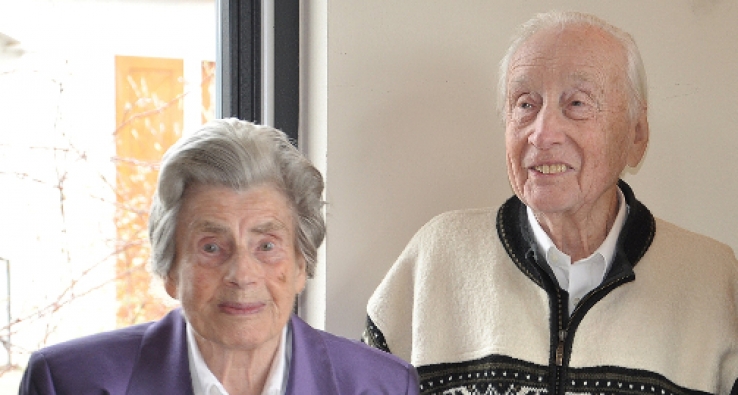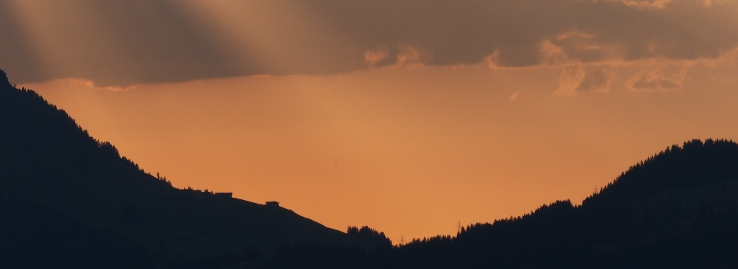Jens
In Honor of my Parents
Where would we be without our parents? Well, obviously we wouldn’t be here. Often we appreciate someone more when we don’t have them anymore. I felt that way recently after my mother passed away just 3 weeks after my father. This way their last wish in life was fulfilled, that when one leaves, the other one can follow soon.
It was quite moving to say good bye to them at their grave side. Even if many of those present and I believe that they are alive in the spirit world, it was a big change, a cut, a loss to not have them around in their physical presence. At the same time it was a learning and growing experience in many ways.
For one, a lot of good memories were shared. Our parents were wonderful people and had a beautiful long life, 101 + 99 years, married for 75 years. Even if someone doesn’t believe in an afterlife, he can see how they live on in their 7 children, 19 grandchildren and so far 19 great grandchildren.
The way my wife Lenka found faith in God was when her grandmother died. It was in the communist days and under that regime neither she nor her family believed in God or in anything spiritual. Since Lenka loved her grandmother a lot, she was very sad when she had passed away. But when she asked, where her grandmother is now, the answer was: ”She is not here anymore, she is gone.” But she couldn’t believe that such a nice woman could just disappear into nothing. So she wanted to find out where she is now and slowly found that there is more to life than what we see with our physical eyes. It opened her eyes to the spiritual world and after some time she discovered and believed in God.
My parents believed in God all their lives. You could see it in their positive way of looking at life, in the way they cared for others and loved children, and not just their own. Their doors were always open to visitors. They loved people and were loved by them. It was quite a crowd which came to the funeral.
My father, as a medical doctor, saved many lives in the 2. World War from the hands of the Nazis. He delivered thousands of babies as a gynecologist and loved kids very much. A close friend of our family, whose children were all delivered by him, told me what a great experience each birth was with his help. She also told me what a nurse at the hospital told her. If a woman did not want her baby, my father would take the baby after the birth in his arms and walked around with it and talked to it and did his best to give that child a warm welcome in his new life.
My mother was humble, modest, with an enormous amount of patience, tolerance and acceptance of others. She would listen to anybody about anything on their hearts. Even to the very end she would endure pain without complains. When her back, legs and feet had open soars from lying in bed and was asked how she was doing, she said as usual: “I’m fine”. She never complained! I believe those strengths came from their close connection, love and dedication to God.
When I saw them in the last days of their earthly life, it made me look at my own life and see what it is all about. It made me think about what am I doing with my life? What is my goal in life? Am I accomplishing my goals? A time like this makes us realize how short our lives are. When Billy Graham was asked a few years ago in his high age, what is the greatest surprise he has found about life, he answered: ”The brevity of it!” When I talked with one of my friends about how the life of our parents was coming to its end, he said: “We are the next ones!”
It went so fast, especially towards the end. A neighbor of my parents told me how she saw my dad still in spring with big garden scissors cutting off strong branches from the ivy on their garden fence. I didn’t think it would go so fast seeing them just a few months ago still living in their own house. It makes me want to show people more love and appreciation while I have the opportunity as I don’t know when I see them again.
Seeing my parents getting more and more helpless reminded me of how babies grow, just in reverse. When babies come to earth, they are totally helpless and need to learn to eat, talk, walk etc. When people come to the end of their lives, they slowly stop doing those very same things. They get ready to leave their bodies, moving on to the spirit world where their soul lives on, like a butterfly has to leave his cocoon to become a beautiful new creature. Or as a seed that has to fall into the ground and die before it can grow into a new plant, our physical bodies have to die so we can begin a new life in the next world.
Both of my parents believed in eternal life with the God who created them. When the priest held the last service in their honor, he kept it very upbeat. He called it the resurrection service and emphasized how they were present with us. It reminds me of what the great evangelist Moody said in his buoyant way: “Someday you will read in the papers that D.L. Moody, of East Northfield, is dead. Don’t you believe a word of it! At that moment I shall be more alive than I am now. I shall have gone up higher, that is all; out of this old clay tenement into a house that is immortal, a body that death cannot touch.”
After the ceremonies, family members who had come from 7 different countries and close friends from the area joined at a Restaurant for some fellowship. It was a nice time meeting each other, sharing hearts, drawing closer to one another. The tears we shed at the grave were replaced by comfort, loving communication and renewed friendship. On our way home you could feel the blessing of the whole experience, looking forward in our lives with new courage, hope and strength. Sadness was turned into joy. I believe our parents will help us from the other side even more than when they were on earth. I feel like Paul wrote in 1.Cor 15:55 “O death, where is your sting? O grave, where is your victory?”
Copyright © 2015 by W. Schmidt
Glimpses of Heaven
Dr. Werner von Braun, well-known for his part in pioneering the U.S. space program, said that he had “essentially scientific” reasons for believing in life after death. He explained: “Science has found that nothing can disappear without a trace. Nature does not know extinction. All it knows is transformation. If God applies the fundamental principle to the most minute and insignificant parts of the universe, doesn’t it make sense to assume that He applies it to the masterpiece of His creation - the human soul? I think it does.”
It is very beautiful over there. – Last words of Thomas Edison
Heaven - the treasury of everlasting life. – William Shakespeare
As he neared his end, John Newton exclaimed, “I am still in the land of the dying; I shall be in the land of the living soon.”
I am standing on the seashore. A ship spreads her white sails to the morning breeze and starts for the ocean. I stand watching her until she fades on the horizon, and someone at my side says, “She is gone.” Gone where? The loss of sight is in me, not in her. Just at the moment when someone says, “She is gone,” there are others who are watching her coming. Other voices take up the glad shout, “Here she comes!” That is dying. – Henry Scott Holland
Surely it is not wrong for us to think and talk about Heaven. I like to find out all I can about it. I expect to live there through all eternity. If I were going to dwell in any place in this country, if I were going to make it my home, I would inquire about its climate, about the neighbors I would have - about everything, in fact, that I could learn concerning it. If soon you were going to emigrate, that is the way you would feel. Well, we are all going to emigrate in a very little while. We are going to spend eternity in another world. … Is it not natural that we should look and listen and try to find out who is already there and what is the route to take? – Dwight L. Moody
Cartoonist Arthur Brisbane once pictured a crowd of grieving caterpillars carrying the corpse of a cocoon to its final resting place. The poor, distressed caterpillars, clad in black raiment, were weeping, and all the while the beautiful butterfly fluttered happily above the muck and the mire of Earth, forever freed from its earthly shell. Needless to say, Brisbane had the average funeral in mind and sought to convey the idea that when our loved ones pass, it is foolish to remember only the cocoon and concentrate our attention on the remains, while forgetting the bright butterfly.
We all long for heaven where God is, but we have it in our power to be in heaven with him right now--to be happy with him at this very moment. But being happy with him now means: loving as he loves, helping as he helps, giving as he gives, serving as he serves, rescuing as he rescues, being with him for all the twenty-four hours, touching him in his distressing disguise. – Mother Teresa
Copyright © 2015: A compilation mostly from “Glimpses of Heaven” Aurora Productions /// Photo by Josef Lierzer
Choosing the Positive
When you change the way you look at things, the things you look at change. — Max Planck
***
Many years ago, I took care of an old man with Alzheimer’s. For over six months, I fed him, gave him his showers, dressed him, kept him company, wiped his butt, and took him for walks. I also fended off his ‘crazy’ spurts—like when he tried to hit me all the way out of the house, then locked me out and was laughing maniacally through the window (Oh, yes. Ha. Ha. Ha.).
I took care of him because in the initial interview, I took to his wife —I really liked her. With dark circles under her eyes, she was completely overwhelmed, struggling to care for him 24/7. But, man … the love she showed her husband; the tender way she looked at him! He had no idea who she was, but still, she didn’t skip a beat. I wanted to help her, so I joined ship.
That period taught me a lot. I was in such a raw state in my own life that I could not bear to be touched. But, sometimes this old man could only be soothed by holding his hand. I’d have to hold his hand and go to this place of stillness inside myself, let that energy come across, and only then would he quiet whatever agitation might have stirred [him] up.
I would watch him for hours as he gazed outside. He saw things that I didn’t. I wondered what they were. I’d wonder if his glasses were magical, that through them he could view other worlds.
You could say he was suffering, but while I’ll never know for certain, I don’t think that was true. His mind was almost gone to another place, but for the most part, he seemed happy and healthy.
The people that really could have been suffering through this were his family members. His many children. His bright wife. But to suffer or not was their choice—and they chose not to. They consciously chose to take his Alzheimer’s in stride. To learn and grow as a family unit. Bond ever tighter. To request help when they needed it (enter me), and form a net of pure love to catch this man who meant so very much to them.
Alzheimer’s was a tragedy in that it took this man, while alive, from his family. It was a gift in that it allowed them an opportunity to grow — in spirit, as a family—in a way they may not have otherwise. They were lovely people. — Meriah / Link
***
There is positive in everything. In every person, in every situation, there is something good. Most of the time it’s not all that obvious. We have to look. And sometimes we have to look hard. The old me was content to sit back and just glance around. If I saw negative, I went with that feeling. I didn’t want to look harder or think too much about the good. I found it much, much easier to sit back and just accept what I saw (which was usually the bad).
Now, when I’m faced with a difficult or challenging situation, I think to myself, “What is good about this?” No matter how terrible the situation might seem, I always can find something good if I take the time to think about it. Everything—good and bad—is a learning experience, so, at the very least, you can learn from bad experiences. However, there’s usually even more to it than that. If you really take the time to look, you will usually find something good, something really positive, about every person or situation.— Dani / Link
***
The greatest discovery of my generation is that a human being can alter his life by altering his attitudes. — William James
***
Choosing a positive attitude is a process. We don't just choose it once and expect everything to be perfect from that moment on. We will still experience setbacks, delays, accidents, frustrations, arguments, fatigue, and fear. The secret is how we choose to react to these experiences. Do we want to let them ruin our day, or do we choose to pick ourselves up and look hopefully to the future again? We do have the power to choose. …
By choosing a positive attitude each day, we are actually attracting more positive experiences, and reducing the likelihood of negative experiences. You may have noticed that each experience often determines the quality of the next experience, causing a chain reaction in our lives. If one little thing goes wrong, it can throw off our plans for the rest of the day. In this context, it's easy to see how a positive attitude would be powerful. Rather than allowing one little thing to ruin our day, we would be able to shrug it off and continue on without a hitch.— Author unknown/ Link
Copyright © 2013 by Anchor







